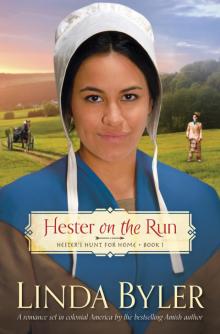- Home
- Linda Byler
The Witnesses Page 7
The Witnesses Read online
Page 7
Was it really expected of him? This forgiveness? How could he forgive an arsonist who had burned his daughter at the stake?
He had no tears, only a pounding heart and a clenched jaw. He’d go, read his Bible, and try to get back on track.
Instead, he found himself sitting at the kitchen table, staring at the picture of Michael Lanvin, the shaggy-haired youth, looking at him from the photo above the article where he said he’d been the arsonist—was the arsonist.
Had he actually hugged that arrogant youth? Blessed him and wished him well? That had been pious of him, obviously. That was, of course, before Sarah had been burned.
Who knew? Did they really know he lit the barns? What was truth? Why? Why did a loving God allow his daughter Sarah to go through this senseless burning? Anger churned through his veins as his Bible lay unopened on the table, his breath coming in hard, frustrated puffs.
Did he believe in God? Had he ever been fit to be a minister? Outwardly, maybe, but had his heart ever been right?
The clock on the wall loudly banged out the seconds, and the refrigerator hummed quietly. Somewhere a wall creaked, and Levi mumbled in his sleep as the mattress beneath him groaned. David Beiler bowed his head as he wrestled with his demons—the purveyors of doubt and self-loathing, of discouragement and a lack of faith.
Suddenly, he sat up, drew back his fist, and slammed it into the black and white photograph of the man that was supposedly the arsonist. He tore the newspaper with the first assault. A coffee cup rattled, tilted, rolled off the kitchen table, and fell to the floor, breaking into dozens of pieces.
Again and again, he slammed the newspaper as great, hoarse sobs tore from his throat and tears rained down his cheeks.
David Beiler’s Gethsemane had come.
Much later, he lay prostrate on the floor, his body convulsing as the force of his cries continued to shake him. His supplications rolled from him in whispers, cries, and questions as he railed before the throne of his God.
Slowly, peace and acceptance emerged, driving back the darkness and the void he had experienced in his place of anger and misery. Gradually, a quietness in his spirit led him to real communication with the One who resides in heaven, supreme. The way before him was clear.
There was no substitute for forgiveness, no question of its balance. But it first had to start with him. He could not allow himself to become short with his brethren. There would be a way. All he needed was the strength to face each new day, for now.
He felt deeply ashamed of his anger. It seemed so wrong, and yet hadn’t Paul said the things he did not want to do were precisely what he ended up doing? David’s human nature hung on his frame like an unbearable cloak, stifling, woolen, and extremely uncomfortable.
Rising, he went to the pantry, found the dustpan and brush, then lowered himself to clean up the broken coffee cup, sweeping up every bit of glass carefully.
Ah, yes, so symbolic was this mug. We need to be broken, again and again, to allow the waters to flow, those life-giving waters of love.
Before David went to bed, he checked on Levi. He adjusted the quilt and patted his son’s shoulders as he did so. Sleep well, Levi, sleep well, he thought.
A love for his handicapped son welled up within him, and he turned, stumbling over the rug as tears blinded his eyes.
Yes, God did know, after all, exactly what He was doing. There were just too many knotty problems to understand the big picture.
After the morning milking, David sat at the breakfast table. He ate the eggs that were fried beyond any hope of having soft, yellow yolks. He also had some burnt toast and the saltines swimming in hot milk, devoid of browned butter. And he praised Priscilla’s attempts at cooking breakfast.
Suzie smiled up at her father.
“I made the toast!”
Levi was scraping anxiously at a blackened slice.
“You left it in the broiler too long.”
“Nah, Levi. It’s good that way,” Suzie answered.
Levi chose to ignore her and asked instead when Mam was coming home.
“Soon, Levi. As soon as Sarah is moved into a regular room. Then you can go see her, and Priscilla can stay for awhile and let Mam come home.”
“Nobody makes me anything to eat,” Levi said so pitifully that Dat smiled widely behind his napkin.
As if someone had planned their lines, there was a knock on the door.
“Come in,” Dat called, without getting up. He simply motioned with his hand, the way country folks living in rural Amish settlements often do.
Matthew was smiling, his handsome face alight with good humor. He was genuinely glad to see his old friends, especially Levi, who returned his sunny greetings effusively.
Matthew was laden with food. The cardboard boxes contained a casserole of lasagna and one of baked corn, loaves of homemade bread, pies, macaroni salad, sausages, and a quivering jello pudding, all leftovers from the ongoing barn raising at Widow Lydia’s.
Matthew inquired about Sarah’s well-being, his face serious, benevolent, and said anxiously that he needed to see her. When Dat told him about the isolation and the upcoming surgeries she would need, the skin grafting, he reconsidered but begged Dat to let him know the minute he could go and would be allowed in her room.
Dat remained kind and assured Matthew he would do everything he could, but he thought that the sooner he saw her, the better. He knew.
Matthew surveyed the now empty breakfast table, looked at Priscilla, and asked if she was the cook. Blushing, she nodded, her large green eyes lowered, the lids heavy with thick, dark lashes serving to enhance her prettiness.
Eyeing her a little longer than necessary, Matthew’s face took on a smile of appreciation and something else that Dat labeled silently.
The surgery went well. The skin they harvested from Sarah’s left side served as patches that they transferred onto the worst of her wounds on her right side.
A few days later, she was allowed to have a mirror, although the doctor counseled her wisely, preparing her for the shock of seeing the damage the fire had done.
Sarah insisted she was prepared. She had braced for the worst scene possible, she really had.
She searched the nurses’ faces for signs of pity or horror, but they remained impassive, professionally trained.
She felt the bandages being unwrapped, the cool air frigid on the newly exposed skin, then took a deep shaking breath and held out her left hand for the mirror.
The skin on her arms and back still pulled painfully, but she moved everything she could, repeatedly, to acquaint herself with the sensation.
When the mirror was before her face, she squeezed her eyes completely shut and lowered it, courage eluding her.
The doctor encouraged her again, and this time she took the mirror and held it up unsteadily, but she did not lower it.
Slowly, a grotesque being came into focus.
Sarah’s first impulse was to open her ruined mouth and scream and to go on screaming and protesting, raging against every force that had brought this bizarre accident into her life.
She was, by all accounts, truly hideous.
Determined, she kept holding the mirror at slightly different angles, examining, peering closely in the garish light from the overhead fixtures.
No hair, anywhere, although there was a slight fuzz on the left side, perhaps. No eyelashes or eyebrows. Red, peeling eyelids. A swollen forehead that was purple, red, and pink on one side. The only way to describe the other side was as some kind of meat, like ground turkey or pork. She guessed that would be sausage.
Well, she had a nose—a good sturdy one at that. The skin was just falling off of it in great peels, like a tomato skin in hot water.
Her lips looked as if she had at least fifty cold sores piled all over each other.
Her neck was barely burned on one side, especially on the underside of her jaw. The right side was where they had done the grafting, which looked much the same as she imaged it would. Skin f
rom her back was adhered to her neck, and, incongruous as it seemed, it did look hopeful.
She smiled to herself. There was one good thing—if her back became itchy, she could scratch her neck.
When she lowered the mirror to her shoulders, she could not keep from crying, helplessly allowing tears to slide down the damaged skin on her cheeks. It was awful.
But she was alive. She was here. The doctors told her that the current methods at the burn center were just short of miraculous, and she was young and strong, something they had assured her repeatedly.
She clung to the words now.
She was taken out of isolation, and her family surrounded her. Allen, Abner, and Johnny must have made a no tears pact—joking and smiling, bringing her silly cards and balloons.
Their wives were less audacious, more reserved, so much so, in fact, that Sarah asked if she looked better or worse than they’d thought. No one provided a forthright answer, so Sarah knew they were shocked at her appearance. Well, so be it. They certainly weren’t the last ones who would experience disbelief.
Maybe she should spend the rest of her life with a paper bag over her head, she told her brothers.
“Make sure it’s one from a chain store that would pay you for the advertising, like Walmart or Target,” Allen said, laughing.
“They use plastic,” Abner said loftily.
Sarah’s back hurt, trying to keep from laughing.
Anna Mae and Ruthie held nothing back, crying until their faces were blotchy and red. Their eyes were swollen, and Ruthie’s glasses were messy with smudges. They said things that weren’t helpful and lots of things that made no sense at all, but they were her sisters. And sisters are like good apples, even the cores and the little black seeds can be eaten and tolerated.
Anna Mae said her eyelashes would grow back. Ruthie said if they didn’t, they’d take Sarah to a face place and have artificial ones sewn on.
Sarah couldn’t smile, but she asked, why bother, a face that looked like meatloaf was not improved by eyelashes. Johnny said if he had a choice, he’d definitely take the meatloaf with artificial eyelashes.
Then Priscilla came, along with Omar and Lydia, who had hoped they could gain entry to her bedside, but it was not to be. Not yet.
Priscilla walked over to Sarah’s bed. Her face turned a sickly shade of green, and she folded up like a graceful ballerina as she drifted slowly to the floor. Allen caught her on the way down.
What a flurry then! Anna Mae and Ruthie had conniption fits, fanning her, sending Allen for Pepsi, saying her blood sugar was way down, she worked too hard, she was always dieting, and somebody needed to go ask a nurse for smelling salts.
No one did their bidding, and Priscilla woke up, blinked a few times, and was fine. She was accosted by her sisters for the next five minutes about protein and energy greens that come in powder form to be mixed with milk or water or juice. They insisted that if she took that, she would never pass out, no matter what.
After they all left, Priscilla and Suzie walked over to Sarah and told her she looked awful. Sarah said she knew that, but it wouldn’t always look this bad.
Suzie, in all seriousness, said she looked like a catfish.
That time, Sarah cracked the skin on her lips. She couldn’t help it, the laughter on the inside wanting to escape so badly.
After they all went home, Sarah slept the first deep sleep since the accident, relaxed in the knowledge that her family loved her, and for now, that was enough.
When she awoke, she was ravenously hungry, pressed the bell, and asked if she’d be allowed a snack.
Almost immediately, her favorite nurse, Alison, brought her apple juice, graham crackers, and peanut butter. She pulled up the blinds, letting the afternoon sun into the room. She told Sarah it was wonderful to hear she was hungry.
She made her spread the peanut butter on the crackers herself, even if it was painful to hold the graham cracker with one hand and spread the peanut butter with the other.
They got her out of bed again, for the third time, and there was nothing to do but grip the walker until her knuckles turned white, bend over as far as they’d allow, and shuffle along as best she could. She clenched her teeth, sucked in her breath, and kept going, refusing to admit defeat. If the hospital staff thought she was capable, then she was.
Tomorrow, the physical therapy would start. For now, Sarah was blissfully unaware of that additional form of torture.
The flowers began arriving then—vases of fresh-cut daisies and carnations and gerbera daisies and little white baskets of potted ferns and peace lilies and vines. They all came with attached cards of well wishes from neighbors and friends.
The largest, most flamboyant bouquet of flowers was from Melvin, and Sarah smiled. The card with a flowery verse written in small letters reminded her of him. He had no doubt driven the florist crazy, reciting these eloquent words for her. They had to be perfect.
So many greeting cards. Eagerly, she read each one, but none were from Matthew. And the phone did not ring, ever. Even if it did, she would not be able to answer it. She found herself gazing at it, thinking how it would be to have only one short conversation with him.
He probably wouldn’t call.
She opened an especially large envelope containing homemade greeting cards from all her pupils at school. That was the highlight of her week. Over and over, she read the words, the innocent get well wishes, and traced the hand-drawn pictures with the tip of her finger, as if to permanently impress every outline in her memory.
Rosanna wrote that she cried for her every day, and Samuel said school was like an empty silo that had no silage in it if she wasn’t there.
Well, now she was like silage. An improvement from a catfish. She grinned to herself.
When Alison poked her blonde head in the door, asking if she needed anything, Sarah said, yes, more graham crackers and peanut butter, but she wanted them with marshmallow cream and coated with chocolate.
Alison laughed and said, “No way, ma’am.”
Before long, another skin graft was done, and Sarah become feverish and short of breath as she came down with a classic case of pneumonia, just when things were going so well.
It was a serious time, a setback for a condition that had been improving far ahead of schedule, the healing multiplying in leaps and bounds.
Rumors abounded, until some well meaning folks actually asked their friends in church which arm of Davey Beiler’s Sarah had to be amputated—the right or the left?
Oh no, they said, nothing was taken off that they knew about. She just had pneumonia. Burn victims often do.
“Vell, my oh (Well, oh my).”
“Who starts this stuff?”
CHAPTER 7
MATTHEW STOLTZFUS WAS THE FIRST ONE TO come see her, after visitors were allowed.
She lay on her pillows, her bed raised to a comfortable position, with her eyes closed, half awake, still weak from the powerful antibiotics used to fight the infection in her lungs.
She wasn’t aware of the fact that visiting hours had started and was shocked to see Matthew, alone, knocking softly on the door frame.
She wanted to pull the sheet up over her head and roll herself into a cocoon, a shroud, and never let him see her.
She could see him recoil, saw the nameless distaste, the horror, and his inability to conceal any of it.
Slowly, he walked closer, his hands clutching his belt, his shoulders hunched beneath his blue shirt.
But, oh, the beauty of him! The sheer wonder that he was here. He had come!
“Sarah. Sarah.” The first word was stammered, as he tried desperately to right himself.
“Hello, Matthew.”
Again, he drew back, and a hissing sound escaped his lips. She was now accustomed to the croak that served as her voice, immune to the shock value of the sound that emerged from her swollen larynx and the tender walls surrounding it.
“How are you?”
She could only nod her
head, the lump in her throat now causing an obstruction too painful to allow even one word.
“Are you in pain?”
Again, she only shook her head, realizing the effect of her croaking attempts at speech.
“Can’t you talk?”
“Yes. But my throat is damaged.”
“Always?”
She shook her head.
The visit fell so far short of her expectations that the pain of it was almost as bad as the physical pain of her wounds.
He volleyed questions at her, hard and rapid. Was she prepared to meet God? Was she born again, truly? Was she willing to confront her parents?
The wearying, mind-numbing questions sent her tumbling down a precipice, where she lay, battered, bruised, reeling mentally from the awful disappointment of his lack of empathy, his selfishness. She finally admitted to herself that that was his problem.
How long would she torment herself with Matthew?
One thing grew relentlessly in her understanding. It was a flowering seed and had lain dormant, but it was growing steadily in the sunshine of her family’s love. She knew she could never leave them.
And the conviction that she wouldn’t have to do that in order to be a Christian grew alongside it, like a sweet-smelling rose.
If God was love, then He was with her family. He was in the imperfect fuss of Anna Mae and Ruthie; He was in their tears and stupid advice. He was in the mood-lifting banter of her married brothers and their faithful wives. He was in the whole circle of them—Mam clucking and stewing and wanting only what was best for her family, and Dat’s agony, his self blame, and Suzie’s comparison of Sarah with a catfish.
As Matthew spoke, quoting endless Bible verses to justify his own desires, she heard only a small part of what he said. She silently nurtured the newfound wisdom that had been imparted to her since the fire as she had endured the agony of debridement, the surgeries, and skin grafting and pneumonia.
Wearily, she nodded or shook her head in response to Matthew’s ramblings, but her heart was faint with fatigue, burned out with the whole deal.
“So, Sarah, what percentage of your hair do they think will grown back? I mean, seriously, you don’t have any.”

 A Second Chance
A Second Chance Lizzie's Carefree Years
Lizzie's Carefree Years The More the Merrier
The More the Merrier Love in Unlikely Places
Love in Unlikely Places Running Around (and Such)
Running Around (and Such) Wild Horses
Wild Horses Lizzie Searches for Love Trilogy
Lizzie Searches for Love Trilogy Lizzie and Emma
Lizzie and Emma Little Amish Matchmaker
Little Amish Matchmaker The Witnesses
The Witnesses The Healing
The Healing Home Is Where the Heart Is
Home Is Where the Heart Is Fire in the Night
Fire in the Night When Strawberries Bloom
When Strawberries Bloom Little Amish Lizzie
Little Amish Lizzie Which Way Home?
Which Way Home? The Homestead
The Homestead Sadie’s Montana Trilogy
Sadie’s Montana Trilogy Davey's Daughter
Davey's Daughter Hester on the Run
Hester on the Run Disappearances
Disappearances Big Decisions
Big Decisions Becky Meets Her Match
Becky Meets Her Match Hope on the Plains
Hope on the Plains Christmas Visitor
Christmas Visitor